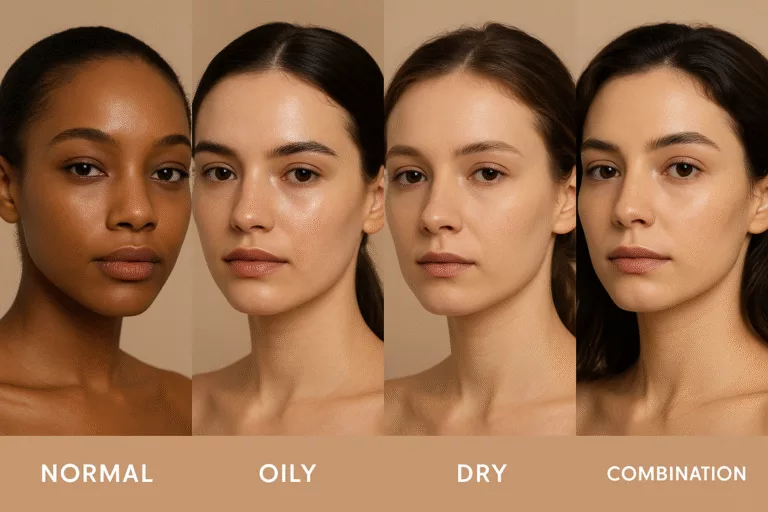Your skin has three layers — the epidermis on top, the dermis in the middle, and a soft fat layer underneath. To figure out your skin type, take a look in the morning when your natural oils (or dryness) are easiest to notice.
Most people have different textures in different areas — that’s called combination skin. If your skin feels the same all over, it’s normal. Lots of shine usually means oily skin, while rough or flaky spots mean dry skin.
Whatever your skin type, don’t forget your sunscreen! A daily SPF of at least 15 helps protect your skin, however SPF 30 or higher is recommended to keep your skin healthy in the long run.
Normal skin
Normal skin is pretty easy to live with. It usually looks even, feels smooth, and doesn’t get too greasy or flaky. Sometimes you might get a few hormonal breakouts, but it’s nothing major—acne isn’t really an issue. It might seem like the lowest-maintenance skin type, but that doesn’t mean you can skip a routine. Without some care, signs of aging and little wrinkles can sneak up on you.
One thing to keep in mind is that normal skin can change with the seasons. It might shift from normal to a bit oily, back to normal, or even get a little dry. Adjusting your skincare routine to match these changes will keep your skin happy and healthy all year round.
Oily Skin
If you have oily skin, you’ll probably notice open pores and that familiar shine, especially around the T-zone (forehead, nose, and chin). This skin type is also more prone to clogged pores, which can lead to blackheads and blemishes.
One of the biggest myths about oily skin is that you should strip away all the oil using harsh cleansers or toners — but that actually makes things worse! When the skin feels too dry, it overcompensates by producing even more oil.
The best routine is to cleanse twice a day, morning and evening, with a gentle cleanser. Follow up with an alcohol-free toner, such as rosewater, to refresh and balance the skin. Even oily skin needs hydration, so choose a lightweight, oil-free moisturiser to keep your skin smooth without feeling greasy.
An oil-based cleanser that you rinse off with warm water can also help balance excess oil, rather than add to it — it sounds strange, but it really works. Try to exfoliate two to three times a week with a mild scrub, paying extra attention to the oiliest areas. Once a week, treat your skin to a clay mask to deeply cleanse and absorb excess oil.
When it comes to makeup, go for water-based foundations instead of oil-based ones, and avoid heavy powder formulas — they can turn patchy on oily skin.
The good news? Oily skin tends to age more slowly, keeps its elasticity longer, and often looks plumper and fresher with time. So while the shine can be frustrating, it’s also one of the reasons your skin stays youthful for longer!
Dry Skin
If you have dry skin, you’ll often feel that tight, stretched sensation — especially after washing your face. Dry skin usually has small, closed pores and doesn’t tend to get blackheads, but it can become flaky, red, or develop fine lines if it’s not properly hydrated. On deeper skin tones, dryness can sometimes appear as dullness or an ashy look due to dead skin build-up. It’s also good to remember that dry skin lacks oil, while dehydrated skin lacks water — and that difference really matters when choosing products.
The best approach is to cleanse gently and hydrate generously. Start by removing makeup with a cream or milk cleanser, massaging it softly into your skin to lift away dirt while keeping your natural oils intact. Follow up with a gentle alcohol-free toner like rosewater — it refreshes the skin without drying it out.
In the morning, use a rich moisturiser to keep your skin comfortable and protected throughout the day. At night, switch to a nourishing night cream or a facial oil to deeply replenish while you sleep. Try not to wash your face too often or expose it repeatedly to water, as frequent wetting and drying can make dryness worse.
Exfoliate once a week with a creamy exfoliator to remove dead skin cells and help your moisturiser absorb more effectively. Overdoing it can irritate the skin, so be gentle and consistent instead of frequent.
When it comes to makeup, let your moisturiser sink in before applying foundation. Choose a hydrating or moisturising foundation, and if your T-zone gets a little shiny, use a light dusting of translucent powder — just enough to tone down the shine without making dry areas look flaky. Cream blushes also work beautifully on dry skin, keeping your complexion soft and radiant.
And don’t forget: healthy skin starts from within. Adding oily fish to your meals or taking omega supplements can boost your skin’s natural oil production, helping it stay supple and glowing.
The best part? Dry skin often looks smooth and refined when it’s well cared for — it just needs a little extra love and moisture to stay radiant.




